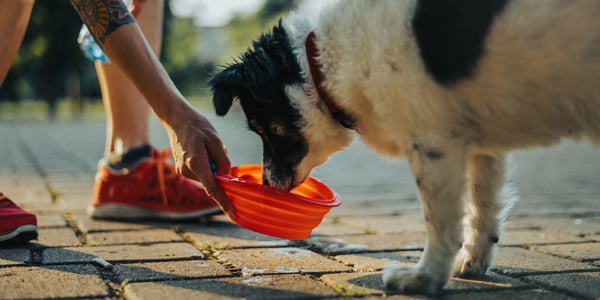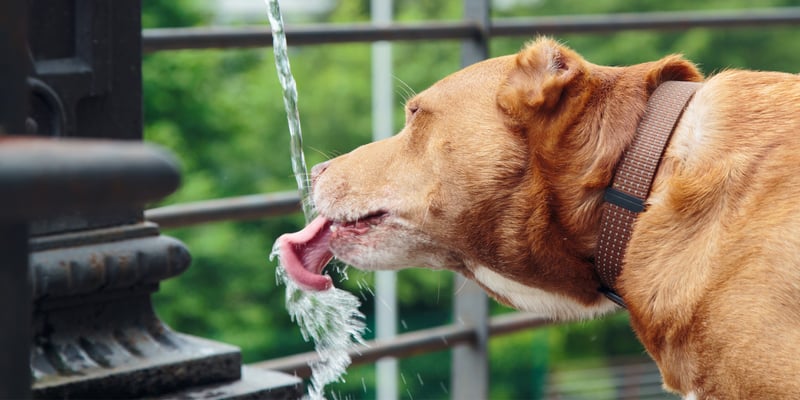Older Dogs and Increased Thirst: Understanding Why an Old Dog Would Drink a Lot of Water
Index:



Introduction
As the autumn years of our cherished companions approach, we often observe the subtle shifts in their routines and behaviours.
We may notice our senior pet beginning to seek out the water bowl with an intensity that causes concern.
A senior dog drinking a lot more than usual can stir a twinge of worry, for with age comes vulnerability. The topic of an old dog drinking a lot of water is one that resonates with many devoted pet owners.
It then leads to questions about increased thirst, excessive water intake and changes in our dog's drinking habits so let’s shed light on this critical sign and what it may mean for the health and well-being of your canine family member.
Key takeaways
Recognising increased thirst in an old dog can indicate underlying health conditions.
Excessive water intake may be symptomatic of various ailments common in senior pets.
Monitoring your senior dog's water consumption helps spot significant changes in their drinking habits.
A proactive approach involves consulting a vet when your dog starts drinking more water.
Diagnostic tests are crucial for identifying the cause behind a senior dog drinking a lot.
Understanding and managing your old dog's health requires a balance of vigilance and care.
Signs and symptoms of increased thirst in senior dogs
Observing a senior dog drinking more water than usual can be disconcerting for pet owners. Enhanced and increased water consumption in your older dog is often more than a simple matter of thirst; it could signal an underlying health condition that merits immediate attention.
Recognising the signs early on and seeking advice from a veterinarian can make a crucial difference to your pet's health.
One of the unmistakable symptoms to watch out for in senior dogs is dehydration.
This condition is not age-specific and can be potentially life-threatening if left unaddressed. Indicators of dehydration are readily noticeable and include a combination of lethargy, apparent weakness, eyes that seem dry and gums and tongue losing their normal moistness.
Another simple check, known as the skin turgor test, can also suggest dehydration if the skin, when gently pinched, does not smoothly return to position.
These symptoms should prompt you to convey your senior dog to the veterinarian.
Lethargy: A noticeable dip in energy levels could be a red flag.
Weakness: An unusual lack of strength in your senior canine may indicate an issue.
Dry eyes, tongue and gums: Watch for any unusual dryness in these areas, as it might indicate that your dog is not drinking enough water per day.
Loose skin: Skin that remains tented after pinching could suggest dehydration.
Under such circumstances, veterinary intervention becomes imperative.
A prompt visit can help diagnose the cause behind the drinking water surplus, ensuring your older dog receives the care they need.
If you're a Waggel member, you can get access to 24/7 vet video consultations with Joii. They're a vet service available at no extra cost and can help you any time of day.
Having pet insurance can be an indispensable aid in managing the potentially rising costs associated with the healthcare of senior pets.
Remember: Increased water intake in senior dogs is not something to overlook. If you're observing that your furry friend is spending more time at the water bowl, it is advisable to consult a veterinarian without delay.



Identifying common health issues behind an old dog drinking a lot of water
It's essential for pet owners to recognise that excessive water intake may be indicative of issues such as kidney failure, diabetes mellitus, or hormone imbalances, among others.
Understanding the common health problems associated with increased thirst can help ensure that your senior dog receives the care they need.
Chronic kidney disease
Kidney failure in dogs often manifests as an inability to conserve water, which leads to increased water consumption and the need to urinate more frequently.
Ageing canines can suffer from a gradual loss of kidney function, which demands particular attention to their water intake and urination patterns.
Standard diagnostic methods include blood tests and urine analysis, where high levels of blood urea nitrogen (BUN) and creatinine, coupled with a low specific gravity of urine, can confirm the diagnosis of chronic kidney disease.
Canine diabetes mellitus
A senior dog drinking more water might be displaying signs of diabetes mellitus, a condition where the body either doesn't produce enough insulin or fails to use it appropriately.
This leads to excessive glucose in the blood, which may then spill into the urine—this process, known as glycosuria, also causes an increased need to drink and pee a lot.
Elevated blood glucose levels and glucose in the urine are key diagnostic indicators for this disease.
Cushing's disease and its effects
Cushing's disease results from an overproduction of the hormone cortisol by the adrenal glands and is characterised by excessive drinking and urination.
Owners might not immediately connect this behaviour with a hormone imbalance, mistakenly attributing an older dog drinking more water than normal to the natural ageing process.
However, additional symptoms such as a pot-bellied appearance, increased appetite, and lethargy can point to this endocrine disorder.
Diagnosis is achieved via blood tests showing high liver enzyme and cholesterol levels.
Dehydration: A prevalent concern
Dehydration in senior dogs can prompt a compensatory increase in water consumption.
This occurs when fluid levels drop to the point where the body's normal physiological functions are compromised, causing the dog to drink excessive amounts of water.
Signs of dehydration include skin that remains tented when pinched and dry mucous membranes. Veterinary assessment is crucial to determine the degree of dehydration and to address the cause effectively.
Properly managing your older dog's health involves careful monitoring of any changes in their drinking habits.
Always consult with a veterinarian if you observe your senior dog drinking more water than usual, as early detection and treatment are crucial for the prognosis of potential health issues.
When rehydrating your dog, follow these steps:
Provide small amounts of water frequently to avoid overwhelming their system.
Observe your dog's response to the water. If they're not interested, consult a vet immediately as this could be a sign of underlying issues.
Consider using wet food to increase fluid intake.
For owners looking to safeguard their pet's health, investing in dog insurance for older dogs might be a wise move.
It can help manage costs for treatments associated with age-related dehydration.



Health conditions associated with older dogs drinking more water than normal
As dogs progress into their senior years, their drinking habits and water requirements often change.
Among several health issues, some common conditions can lead to increased water consumption.
Noticing your senior dog drinking more can be a sign to check for possible health concerns.
Urinary tract infections
One frequent ailment in older canines is a urinary tract infection (UTI), which can incite a noticeable uptick in water intake due to the discomfort and bladder irritation caused by the infection.
Bladder problems such as these should not be overlooked, as they can lead to further complications if not treated promptly with the necessary antibiotics.
Understanding this and related conditions, such as dog incontinence, is crucial for comprehensive care.
Dietary changes causing increased thirst
Any change in diet might prompt your senior dog to drink excess water. The transition from moist to dry food or an increase in salt within their diet could result in your dog drinking additional water to stay hydrated.
Keeping water available at all times is crucial when adjusting their diet to maintain their hydration levels.
For more on managing different diets, see how much raw food to feed a dog.



Conclusion
As the caretakers of ageing companions, it's up to us to be vigilant when it comes to our senior dogs and their health.
Monitoring how much water a dog drinks is particularly vital, as changes can be indicative of underlying health issues.
Senior dogs may exhibit increased thirst as a symptom of various conditions, ranging from dehydration to more complex endocrine disorders.
It’s our responsibility to observe these changes and ensure your senior pet’s continued vitality and comfort.
Understanding the reasons behind an old dog drinking a lot of water and being alert to other behavioural shifts is a concern for senior dog owners.
It aids in early detection and prevention of potential ailments. By maintaining a regular schedule for veterinary checkups, you can monitor their water intake effectively.
It’s crucial to provide clean and fresh water at all times, so they have constant access to hydration, thereby preventing any adverse health outcomes that may stem from inadequate water consumption.
Ultimately, our goal is to safeguard the well-being of our cherished pets during their golden years. In managing your older dog's health, dietary supplements can also play a significant role.
To understand how supplements might benefit your pet, including in terms of hydration and overall health, explore the benefits of dog supplements for more helpful information.
Waggel Pet Insurance
Need more help? You're in luck if you're a Waggel Pet Insurance member. Along with our excellent coverage, we offer access to a 24/7 online vet to answer all your sticky questions, especially if you need grooming assistance.
Not a member? Why not get a quote now and cover your furry friend for a range of illnesses, all while enjoying our amazing perks and rewards.
Want more like this?
Get updates from us with helpful info, advice, answers to frequently asked questions and much more.
Index:
Related posts:
Get your quote
Along with our excellent coverage, we offer access to a 24/7 online vet to answer all your sticky questions.





